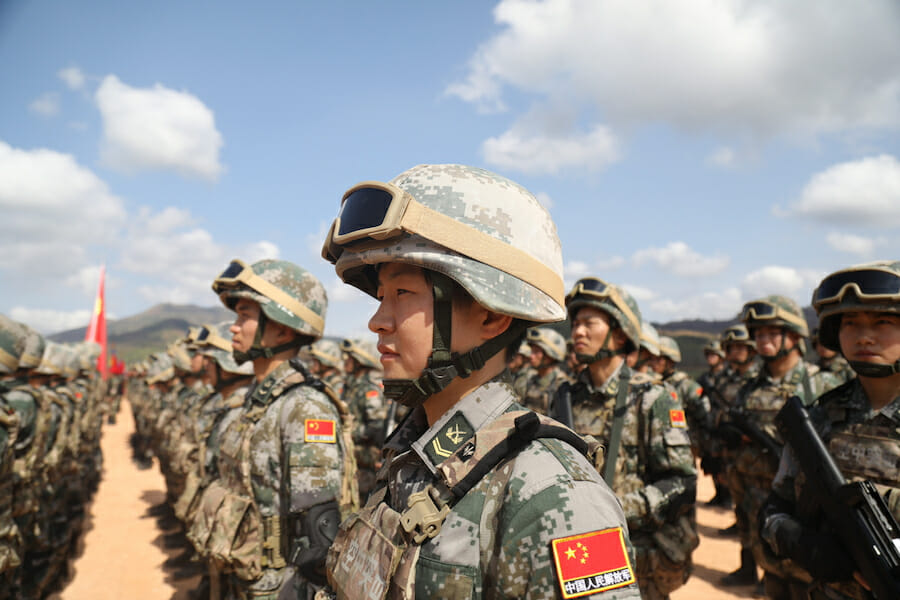A rising China is coming. Economically, Beijing is currently the second-largest economy by nominal gross domestic product (GDP) and the largest by purchasing power parity. Such economic growth has been a base for military modernization, with a significant focus on developing maritime capabilities. With long land borders, China has been a land-based power, but recently, it is shifting its attention to developing its navy since the 18th Party Congress in 2012, when then-President Hu Jintao called China to become a “maritime power” – both because a significant portion of trade travels by sea, but also to be able to project power abroad.
For the past few years, island building in the disputed South China Sea has been in the headlines. Since then, both China’s fleet size and capabilities have rapidly grown both in quantity and quality, including its shipbuilding industry. In terms of power projection in the far seas, China’s People’s Liberation Army (PLA) had set up its first overseas military base in Djibouti, a tiny country in the Horn of Africa in a break of Beijing’s longstanding policy of not establishing overseas military bases.
The 2019 Defense White Paper from China has called for the country to “build a strong and modernized” navy that is able to carry missions “on the far seas,” and the U.S. Defense Intelligence Agency’s China’s Military Power report in 2019 concluded that China’s focus on maritime power reflects a “consensus in China that maritime power is essential to advancing China’s interests.” Despite the significance of China’s military build-up overseas, in particular its base in Djibouti and how it reflects on China’s maritime strategy, there have been few studies on why China’s Navy has postured to Djibouti for its first overseas base, as well as how China’s military and commercial operations intersect in Djibouti.
A new report published by the U.S. Naval War College’s China Maritime Studies Institute called “Djibouti: China’s First Overseas Strategic Strongpoint” provides an excellent overview of Djibouti’s strategic geography and how China views it, the functions and capabilities of the military base in Djibouti along with other important details on the characteristics of the China operated port and free trade zone and the transport infrastructure that is built to “service the port and expand its economic and strategic impact.”
The authors of the report, Peter A. Dutton, Isaac B. Kardon, and Conor Kennedy, who are all affiliated with the U.S. Naval War College have thoroughly examined “the development of this overseas support system” by tracking China’s efforts to establish a “robust overseas commercial, diplomatic and military presence” in Djibouti. The report is a major breakthrough as it highlights the significant link between the military base and China’s commercial interest in Djibouti by indicating that the military base “cannot be understood without examining the role of the Chinese firms that preceded it.” These firms had built and operated the physical infrastructure, which played a significant role in establishing China’s military presence in the Horn of Africa and deepened the bilateral ties between China and Djibouti.
The Sino-Djibouti partnership has been upgraded to a “comprehensive strategic partnership” in 2017 when President Ismail Omar Guelleh of Djibouti paid a visit to Beijing, but the two countries have been developing close economic and commercial ties since the early 2000s. China played a significant role in building Djibouti’s infrastructure development, industrial parks, free trade zone, and pipelines, while Djiboutian policymakers, anxious to attract foreign direct investments to position the country as a “logistics and commercial hub” to offer trans-shipment services to landlocked Ethiopia welcomed this arrangement. There is a concern on the debt-distress created by the Chinese investments in Djibouti as Beijing is currently both the largest creditor and debtor of Djibouti, but policymakers in Djibouti, which view China as the only country that is willing to fund these projects, downplayed the debt-stress concerns.
For China, Beijing is testing an “emerging strategy of using its economic influence to advance its security interests.” While the current military base in Djibouti does not offer “a significant wartime capability” for China in its current form, it does serve largely as a “logistics, supply and intelligence” hub for Chinese operations in the Indian Ocean. China does not seek any raw material from Djibouti, but its geographic position is what attracted Beijing’s strategists to set up a base.
For the military base, which China calls a “support facility” in order to downplay its military significance, the report found that the base is capable of “supporting a wide range of PLA operations” beyond logistical support and has the potential to station as many as 10,000 personnel. The base also can make longer duration deployments for the PLA Navy possible and it also offers a more secure environment for the forces that are operating in the region. The report concluded that the military base in Djibouti combined with Beijing’s growing partnership with Djibouti is part of a Chinese strategy to “establish a strategic position” in both the western Indian Ocean and the Horn of Africa and it ensures that Beijing is capable of projecting power while the report suggests that the military base in Djibouti is “probably not the model for how Chinese strategic strongpoint will develop” in the future.

No comments:
Post a Comment